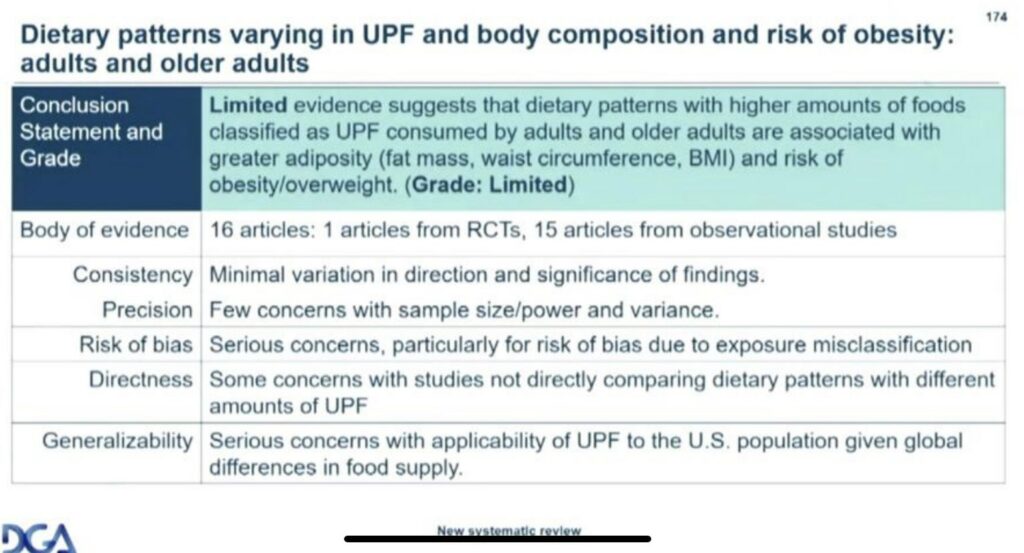The recent announcement by the US government’s “top diet advisors” claiming that ultra-processed foods do not cause obesity is not just misleading—it’s an outright lie designed to protect the interests of megacorporations profiting from our deteriorating health. As the country with the highest obesity rates globally, this statement starkly contrasts with the lived experiences and struggles of millions of Americans. It’s hard to fathom how, amidst an obesity epidemic that has gripped the nation for decades, such a conclusion could be drawn. Let’s delve into why this claim is not only false but also dangerous, and why it’s time we reconnect with the reality of our food and just eat real food.
Understanding Ultra-Processed Foods
Ultra-processed foods are industrial formulations made entirely or mostly from substances extracted from foods (oils, fats, sugars, starch, and proteins), derived from food constituents (hydrogenated fats and modified starch), or synthesized in laboratories (flavor enhancers, colors, and several other additives used to make the final product hyper-palatable and often attractive to consumers). These foods typically come in convenient, ready-to-eat or heat packages and are designed to be cheap, tasty, and have a long shelf life.
Examples of Ultra-Processed Foods Include:
- Soft drinks
- Packaged snacks
- Candy and confectionery
- Mass-produced cakes and pastries
- Pre-prepared frozen meals
- Processed meats (hot dogs, sausages)
- Instant noodles and soups
 Despite their convenience and appealing taste, these foods are often nutritionally imbalanced, containing high levels of sugar, fat, and salt, but lacking in essential nutrients, fiber, and protein.
Despite their convenience and appealing taste, these foods are often nutritionally imbalanced, containing high levels of sugar, fat, and salt, but lacking in essential nutrients, fiber, and protein.
Government’s Stance vs. Ground Reality
According to what has been shared in the recent report by the US Dietary Guidelines Advisory Committee (DGAC), the evidence linking ultra-processed foods to obesity is inconclusive. The report suggests that previous studies may have been biased and that there’s no definitive proof that ultra-processed foods cause more weight gain than other types of food. This conclusion seems to contradict a large body of research linking these foods to various health problems, including obesity, diabetes, heart disease, and even cancer.
Key Points from the Report
- Bias Concerns: The DGAC expressed concerns about potential bias in studies linking ultra-processed foods to obesity, citing issues like misclassification bias due to the vague definition of ultra-processed foods.
- Call for More Research: The committee emphasized the need for more research to establish a clear link between ultra-processed foods and obesity.
- Definition Ambiguity: The NOVA classification system, which defines ultra-processed foods, was criticized for being open to interpretation.
But let’s not be naive. These so-called “bias concerns” are a convenient excuse for the government to sidestep the glaring truth: ultra-processed foods are making us sick, and they are willing to lie to our faces to protect the profits of the food industry giants.
Health Risks of Ultra-Processed Foods
Numerous studies have highlighted the connection between ultra-processed food consumption and obesity. A study published in the Canadian Journal of Public Health found a strong association between the consumption of ultra-processed foods and obesity among Canadian adults. Another study from Harvard Public Health emphasized that chronic food illnesses, such as obesity, diabetes, and heart disease, are significantly influenced by the consumption of these foods.
Mental Health
Research has also indicated that diets high in ultra-processed foods are linked to poor mental health outcomes. These foods can lead to inflammation and negatively impact the gut-brain axis, contributing to conditions like depression and anxiety.
Cancer
Many studies have revealed that high consumption of ultra-processed foods was associated with an increased risk of developing cancer. This is likely due to the high levels of sugars, fats, and various additives that can contribute to the development and progression of cancerous cells.
Yet, despite all this damning evidence, the government wants us to believe that ultra-processed foods are harmless. It’s time to wake up to the reality that our health is being sacrificed at the altar of corporate greed.
The Reality of the American Diet
In the United States, ultra-processed foods account for more than half of the total caloric intake for many people. This dietary shift has profound implications for public health. The rise of these foods in our diet coincides with increasing rates of obesity and related chronic diseases.
Grim Statistics
- Approximately 42% of American adults are obese, according to the Centers for Disease Control and Prevention (CDC).
- Nearly 10% of children between 2 and 5 years old are already obese, with the rate rising to 20% among teenagers.
- Chronic diseases linked to diet cause more than 678,000 deaths in the US annually, a number higher than all combat deaths in American history combined.
These statistics are a damning indictment of the impact of ultra-processed foods on our society. The government’s refusal to acknowledge this is not just irresponsible—it’s criminal.
Disconnection from Real Food
One of the core issues exacerbating the obesity epidemic is our growing disconnection from real food. The convenience and prevalence of ultra-processed foods have led many people to forget what real, wholesome food looks and tastes like. This disconnection has several detrimental effects:
Nutritional Deficiencies
Ultra-processed foods are often nutrient-poor, leading to deficiencies in essential vitamins and minerals. Whole foods, on the other hand, provide a broad spectrum of nutrients necessary for maintaining good health. These nutrients work synergistically to support the body’s various systems, including the immune system, the cardiovascular system, and the nervous system. When we replace whole foods with ultra-processed alternatives, we miss out on these vital nutrients, leading to various health issues, from weakened immunity to chronic fatigue.
Overeating
These foods are designed to be hyper-palatable, making it easy to overeat and consume excessive calories without feeling full. The human body is biologically wired to seek out and consume energy-dense foods, a trait that has been exploited by food manufacturers. By enhancing the flavors of these foods through additives and sweeteners, manufacturers create products that are difficult to resist, leading to overconsumption and, subsequently, weight gain. This overeating is often exacerbated by the low satiety levels provided by ultra-processed foods, which do not fill us up as whole foods do, leading to a cycle of continuous eating.
Loss of Food Culture
Traditional food practices and the knowledge of cooking from scratch are being lost, replaced by a culture of convenience. This shift not only affects our health but also disconnects us from the rich cultural traditions that revolve around food. Cooking and sharing meals are fundamental aspects of many cultures, providing opportunities for bonding, celebration, and the transmission of cultural heritage. As we move away from these practices, we lose these valuable experiences, further eroding our relationship with food and its role in our lives.
The Importance of Just Eating Real Food
To combat these issues, it’s crucial to promote and practice the consumption of minimally processed, whole foods. This includes fresh fruits and vegetables, whole grains, lean meats, and dairy products without added sugars or artificial ingredients. The concept of “just eat real food” (JERF) is a simple yet powerful message that emphasizes the importance of consuming whole, unprocessed foods. This approach can significantly improve public health by reducing the intake of harmful additives, sugars, and unhealthy fats found in ultra-processed foods.
Benefits of Eating Real Food
Improved Nutrition: Whole foods are packed with essential nutrients, fiber, and healthy fats that support overall health. These nutrients are often stripped away during the processing of ultra-processed foods, leaving behind empty calories that contribute little to our nutritional needs. By focusing on whole foods, we ensure that our bodies receive the vitamins, minerals, and other nutrients they need to function optimally.
Better Satiety: Real foods are more filling, helping to prevent overeating and weight gain. Foods rich in fiber, protein, and healthy fats promote feelings of fullness and satisfaction, reducing the likelihood of excessive snacking and overeating. This is a stark contrast to ultra-processed foods, which are designed to be consumed quickly and in large quantities without providing lasting satiety.
Enhanced Flavor and Variety: Cooking from scratch allows for greater control over ingredients and flavors, making meals more enjoyable and diverse. This not only supports better health but also encourages a more varied and interesting diet. Experimenting with different recipes and ingredients can make healthy eating an enjoyable and sustainable lifestyle choice.
The Role of Policy and Education
While individual choices are important, broader policy measures are essential to address the obesity epidemic effectively. This includes regulating food marketing, improving food labeling, and supporting nutrition education.
Regulating Food Marketing
Restricting the marketing of ultra-processed foods, especially to children, can help reduce their consumption. Children are particularly vulnerable to aggressive marketing tactics that promote unhealthy foods, and limiting these advertisements can help protect their health and foster better eating habits.
Improving Food Labeling
Clear labeling on food products can help consumers make informed choices about what they eat. Labels that highlight the nutritional content and potential health risks of ultra-processed foods can guide consumers towards healthier options and increase awareness about the impact of their food choices.
Supporting Nutrition Education
Increasing public awareness about the benefits of whole foods and the dangers of ultra-processed foods can encourage healthier eating habits. Education initiatives can be implemented in schools, workplaces, and communities to promote nutritional literacy and empower individuals to make better food choices.
Countries like Brazil have implemented guidelines that emphasize the consumption of minimally processed foods and discourage the intake of ultra-processed products. These measures have been successful in promoting healthier dietary patterns and could serve as a model for the US. By adopting similar guidelines, the US could take significant steps toward improving public health and reducing the prevalence of obesity and related diseases.
The Insulting Reality
The recent government stance on ultra-processed foods not causing obesity is not only misleading but also undermines the efforts of health professionals and researchers who have long warned against these foods. It is an affront to the countless individuals and families struggling with obesity and related health issues, many of whom rely on accurate information to make better dietary choices. This is not just a matter of negligence; it is a deliberate attempt to deceive the public and protect corporate interests at the expense of our health.
Call to Action
It’s time to challenge this narrative and advocate for policies that promote the consumption of real, whole foods. By doing so, we can address the root causes of the obesity epidemic and improve the health and well-being of future generations. The concept of “just eat real food” is more relevant than ever. In a world where convenience often trumps health, reconnecting with the basics of nutrition can have profound impacts on our health and quality of life.
Remember: Just Eat Real Food (JERF) – for your health and future.
Our journey towards better health begins with the choices we make daily. By prioritizing whole, minimally processed foods, we can take control of our health, support sustainable food practices, and foster a deeper connection with the food we eat. This shift requires not only individual commitment but also collective action to create a food environment that supports and promotes healthy choices.
Conclusion
The US government’s recent claim that ultra-processed foods do not cause obesity is a dangerous oversimplification that ignores the overwhelming evidence linking these foods to numerous health issues. As the obesity epidemic continues to plague the nation, it is imperative to promote the consumption of real, minimally processed foods and implement policies that support this shift. Only by reconnecting with the reality of our food and making informed choices can we hope to reverse the alarming trends of obesity and chronic disease.








